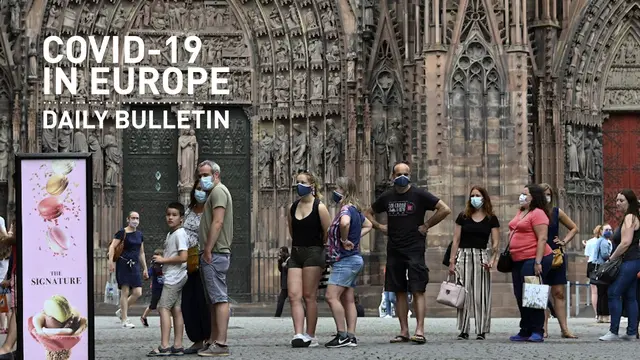TOP HEADLINES
-
France had 8,550 confirmed cases on Saturday down just over 400 from the new record high of daily additional infections reported on Friday.
-
Seven more departments covering major cities such as Lille, Strasbourg and Dijon are now officially on high alert as infections accelerate , the French government said Sunday. Of 101 mainland and overseas departments, 28 are now considered "red zones" where authorities will be able to impose exceptional measures.
**- **The French government says pre-school teachers, as well as those with deaf students, will be given transparent masks to wear in class.
- Russia has reported a further 5,195 cases in the past 24 hours taking its total to 1,025,505, the fourth largest in the world. There were 61 more deaths.
-
Volkswagen has said there is no need for a four-day week after Germany's largest trade union IG Metall proposed it partly in response to the economic impact of coronavirus.
-
UK Prime Minister Boris Johnson and Finance Minister Rishi Sunak have agreed to cut personal taxes before the next election but will have to raise them now to raise money because of COVID-19, reports the Sunday Times.
-
Ireland must set aside at least one billion euros for a no-deal Brexit in next month's budget for 2021, Foreign Minister Simon Coveney told the Sunday Independent. It comes after the 1.2 billion euros set aside for Brexit a year ago was swallowed up by the cost of COVID-19.
-
** Portugal had 486 new coronavirus cases on Saturday** , its biggest daily increase since the week its lockdown was lifted in May. It brings the overall number of cases in the country to 59,943.
Children at a school in St Petersburg, Russia, with the country having had more than 5,000 new cases in the past 24 hours. Kirill Kudryavtsev/AFP
ACROSS EUROPE
Stefan de Vries, in Amsterdam
In the Netherlands, 654 people have tested positive for COVID-19, a slight increase compared with the last couple of days.
Opposition party, Green Left, will vote against a special coronavirus law which would make it possible for the government to bypass the parliament when introducing new measures to fight the spread of the virus. "Fundamental rights can be limited, but this can only happen through the people's assembly," Green Leader Jesse Klaver said.
On Curaçao, in the Dutch Caribbean, all birthday parties and other home gatherings are now forbidden. Since the beginning of the crisis, 88 people on the island have been infected, with one person having died from COVID-19.
The UK
After a month or so of relatively stable numbers in the UK despite an easing of restrictions, the UK has seen a small rise in cases in recent days, with officials reporting 1,813 new infections over a 24 hour period on Saturday. That comes after a week in which schools in England also returned for the start of the autumn term.
The Speaker of the House of Commons has suggested that MPs could be tested daily for COVID-19 as a way of allowing more of them to be in the Commons chamber for debates. At the moment, numbers allowed in are heavily restricted to allow for social distancing, with some questions having to be made via video-link. MPs are not required to wear masks in the chamber.
In case you missed it:
•
Why are migrant and refugee numbers falling in Europe?
•
Can sunshine and a beach view help recovery from COVID-19?
Germany
Case numbers dropped on Sunday in Germany, according to the country's public health institute, with 988 confirmed to have the virus and just a single death. The reproduction rate stands at 1.0 says the Robert Koch Institute, meaning a single case on average passes the virus on to one more person. That means the infection rate is stable but cannot rise further.
The country now has had 249,985 cases of coronavirus with a total of 9,325 deaths. The German government has opted to toughen up the coronavirus restrictions in recent weeks to stop new outbreaks and advice not to travel to high-risk regions.
Croatia
Around 3,000 protestors gathered in Zagreb on Saturday to complain at the coronavirus restrictions put in place by the government. It is reported that many people didn't wear masks or follow social distancing rules as they carried banners calling for "liberty."
Croatia, with a population of 4.2 million people, was one of the countries that suffered least in Europe at the start of the virus outbreak, but after opening up to tourists in July it saw an increase in cases. There were 311 new cases on Saturday.
Check out our new six-part podcast series
** Notes on a Pandemic**
** as CGTN Europe finds out how business, science and people have risen to the challenge of COVID-19.**
Source(s): Reuters ,AFP
 简体中文
简体中文

